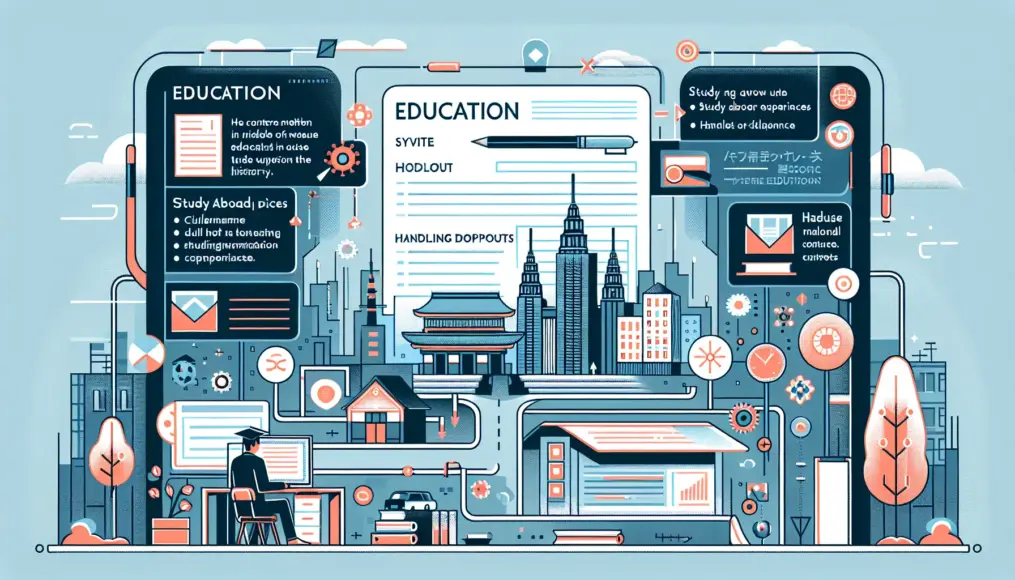The education section of your resume is a crucial part of showcasing your career. It’s essential to provide clear and accurate information, but you might find yourself wondering how to do that effectively. In this article, we’ll explore how to write this section, including tips on how to include study abroad experiences or details about leaving school before graduation.
We’ll also share strategies for making a positive impression on interviewers and offer culturally sensitive ways to express your educational background. By grasping these key points, you can confidently polish your resume and enhance your job search success.
- Detailed guide on how to structure your education section
- Effective ways to mention study abroad experiences or leaving school early
- Tips for making a great impression on interviewers
How to Properly List Your Education on a Resume
The education section of your resume is a crucial part that highlights your academic background. Let’s go over the basics to ensure you present your education accurately. It’s essential to list your information in chronological order and verify the official names of schools and degrees. This attention to detail can help you make a positive impression on hiring managers.
By understanding the correct way to present your education, you can stand out in the eyes of potential employers. In the following sections, we’ll take a closer look at how to effectively list your educational qualifications.
Listing Education in Reverse Chronological Order
The standard practice is to list your education starting with the most recent entry. This format allows hiring managers to quickly grasp your academic history. It also emphasizes the importance of your most recent school or qualifications.
When listing your education, be sure to include the school name, department, major, year of entry, and year of graduation clearly. It’s especially important to get the graduation year right. If you experienced any delays or transfers during your education, mentioning those can provide a clearer picture of your academic journey.
- List your education starting with the most recent entry
- Clearly state the school name, department, major, year of entry, and year of graduation
- Include any necessary information about delays or transfers
Verifying Official Names of Schools and Degrees
When documenting your education, it’s crucial to confirm the official names of your schools and departments. Using official names instead of abbreviations or common names enhances your credibility. This is particularly important for international institutions, as their official names may differ.
Additionally, accurately stating your degree titles can help showcase your expertise. For instance, use terms like “Bachelor’s Degree” or “Master’s Degree” to clearly communicate your qualifications. This precision helps hiring managers better understand your educational background.
- Use official names for schools and departments
- Avoid abbreviations and common names
- Accurately state the names of your degrees
How to Write About Study Abroad Experiences and Leaving School Early on Your Resume
When it comes to the education section of your resume, including information about study abroad experiences and early departures from school is crucial. These elements are important for showcasing your educational background and international experience. However, many people struggle with how to present this information effectively. By understanding the right way to describe these experiences, you can make a strong impression on potential employers.
Let’s explore some specific points on how to write about your study abroad experiences and leaving school early. This will help you convey your background in a more appealing way.
How to Describe Your Study Abroad Experience
Studying abroad is a fantastic opportunity to highlight your global perspective and language skills. Be sure to include the name of the institution, the country, and the duration of your study. If you earned any qualifications or degrees during your time abroad, it’s also a good idea to mention those. Providing concrete details helps convey your purpose and achievements from the experience.
For example, you might say, “I studied at XYZ University in the United States from April 2020 to March 2021, majoring in International Business.” This kind of specific information adds depth to your educational background.
- Include the name of the institution, country, and duration of study
- Mention any qualifications or degrees earned
- Provide specific details to convey your achievements
How to Explain Leaving School Early
If you have left school early, it’s important to be honest about the reasons behind your decision. For instance, if you transferred schools or changed your career path, explain that clearly and emphasize the experiences you gained afterward. Even if you have an early departure on your record, you can create a positive impression by highlighting what you learned and the skills you developed.
Additionally, mentioning what you gained from your early departure can help form a constructive narrative for hiring managers. For example, you could say, “I left ABC University early and taught myself programming. I am currently working as a freelance engineer.” This type of specific appeal can be very effective.
If you’re looking to deepen your knowledge about resumes, we recommend checking out this article: “Make Your Education Stand Out on Your Resume! A Comprehensive Guide to Writing Tips.” It offers practical techniques for effectively showcasing your educational background and is packed with valuable information to help you craft your resume.
- Be honest about the reasons for leaving school early
- Emphasize the experiences that followed
- Clearly outline what you learned and the skills you gained
Expressing Educational Background with Cultural Context in Mind
When it comes to listing your educational background on a resume, the approach can vary significantly depending on cultural context. This is especially true when including degrees obtained overseas, as it’s essential to accurately represent the educational system and terminology of that country. By considering cultural differences in your expressions, you can effectively communicate your background to hiring managers.
In this section, we’ll delve into how to properly list foreign education and express cultural nuances. This will provide you with tips to showcase your international experience effectively on your resume.
How to List Overseas Education
When listing degrees earned abroad, it’s vital to use expressions that align with the educational system of that country. For instance, in the United States, degrees should be referred to as “Bachelor’s degree” or “Master’s degree,” using the official terms. Accurately stating the name of the institution and the field of study also boosts your credibility.
Additionally, it can be beneficial to include a brief explanation in Japanese if necessary. This is especially useful if the hiring manager is not familiar with that country’s educational system, as it helps clarify your qualifications.
- Use expressions that align with the country’s educational system
- State degrees using their official titles
- Adding a Japanese explanation can be helpful in some cases
Considering Cultural Differences in Expression
Taking cultural backgrounds into account is crucial for applicants with international experience. Different cultural environments often place varying values on education and the skills that are prioritized, so it’s important to tailor your expressions accordingly. For example, in Western countries, practical skills and hands-on experience are often emphasized, making it effective to highlight specific projects and achievements.
Moreover, by understanding cultural differences and using expressions that reflect them, you can showcase your global perspective to hiring managers. This can set you apart from other candidates.
If you found this article helpful in understanding how to list your overseas education, you might also be interested in this article: “A Guide to Highlighting Your Experience on Your Resume.” This guide offers practical techniques for effectively presenting your experiences on your resume, so be sure to check it out!
- Understand the value placed on education in different cultures
- Emphasize practical skills and experiences
- Use expressions that highlight your international perspective
Tips for Making Your Education Section Shine in Interviews
Your education section on a resume is a crucial element that highlights your academic background. To leave a positive impression on interviewers, it’s essential not just to list your qualifications, but also to identify key points to emphasize and express them clearly and concisely. With the right strategies, your educational background can appear more appealing and increase your chances of being evaluated positively.
In this section, we’ll explore how to choose the points you should emphasize and effective ways to present them. This will help transform your resume into a more effective tool for self-promotion.
How to Choose Key Points to Emphasize
When creating your education section, it’s vital to select which points to highlight. Focus on academic achievements and skills that are relevant to the job or industry you’re applying for, as these will resonate more with interviewers. For instance, if you studied a specific field, detailing what you learned or any notable achievements related to it can be particularly impactful.
Additionally, experiences such as studying abroad, special projects, or relevant certifications can serve as significant selling points. Clearly showcasing these elements demonstrates how your education can contribute to the role, enhancing the overall impression you make on the interviewer.
- Highlight education and skills relevant to the job
- Include study abroad experiences or special projects
- Show how your education can contribute to the role
Tips for Clear and Concise Expression
In the education section of your resume, clarity and brevity are key. Avoid long sentences and complex vocabulary; instead, aim for language that is straightforward and easy to understand. Organizing details like school names, degrees, and graduation years concisely will improve readability and leave a good impression on interviewers.
One effective strategy is to use bullet points to organize information. Presenting details in a visually accessible format makes it easier for interviewers to grasp your educational background at a glance.
- Aim for clear and concise expressions
- Avoid difficult words and lengthy sentences
- Use bullet points to organize information
Summary
The education section of your resume is a crucial part that conveys your academic background. Understanding how to write it correctly can leave a positive impression on interviewers. It’s important to list your education in chronological order and to express experiences like studying abroad or reasons for leaving school appropriately. Additionally, considering cultural nuances and choosing the right points to highlight can make a significant difference.
By focusing on clear and concise language, you can make your resume more effective. Keep these tips in mind as you craft an appealing education section that stands out.
- List your education in chronological order and provide accurate information
- Clearly explain study abroad experiences and reasons for leaving school
- Aim for concise and easy-to-understand expressions
Make sure to effectively showcase your strengths through your resume. If you found this article helpful, we’d love to hear your thoughts in the comments!



Comment